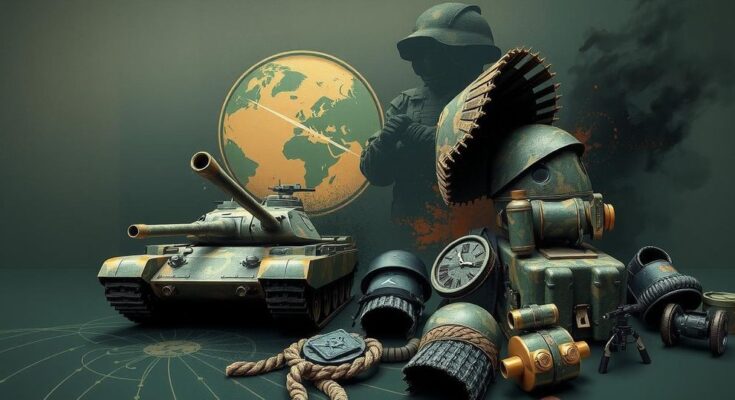The United States sanctioned a Rwandan minister and M23 spokesperson amid ongoing conflict in eastern DRC, raising concerns about Rwanda’s military support for M23. Analysts cite excessive rearming by Rwanda and potential objectives of M23 to dominate regions in eastern DRC. The peace initiative remains muddled with conflicting allegiances from regional actors like Uganda. President Tshisekedi demands international accountability for escalating violence as Rwanda defends its actions amid sanctions.
On February 16, 2023, a Rwandan government minister and a spokesperson for the M23 rebel group were sanctioned by the United States for their alleged roles in the ongoing conflict in eastern Democratic Republic of Congo (DRC). This development follows the M23’s conquest of Goma, the largest city in eastern Congo, raising concerns regarding the group’s military capabilities and support from Rwanda.
Analysts, including Sasha Lezhnev from The Sentry, indicate that the M23 rebels are receiving significant military backing from Rwanda, which reportedly has thousands of troops in the DRC. Following inspections, several United Nations reports over the past three years support claims that Rwanda has intensified its military involvement in the region.
Although Rwanda refutes the allegations, Lezhnev argues that the escalation of the crisis could have been averted had international attention been maintained over recent years. He noted that the rearming of M23 by Rwanda began about four years ago, leading to a deterioration in stability, further exacerbated by recent diplomatic measures taken by the United States, including sanctions on Rwandan generals.
Rwanda’s President Paul Kagame accuses the DRC of backing the FDLR, a rebel faction comprised mainly of Hutu fighters, some of whom were involved in the 1994 Rwandan genocide. The M23 group, which initially took control of Goma in 2012, is now one among over 130 armed groups across eastern DRC, all of whom are vying for control over its lucrative mineral resources.
Claude Gatebuke, a Rwandan genocide survivor, asserts that Rwanda, together with Uganda, aims to exploit the DRC’s resources for the benefit of Western multinational companies. He stresses that evidence supporting these claims is well-documented, suggesting a coordinated effort to access valuable natural resources in the region.
Mvemba Phezo Dizolele from the Center for Strategic and International Studies labels the situation as perplexing, noting Uganda’s dual role in fighting alongside Congolese forces against extremist groups while simultaneously being implicated in instigating instability within the DRC. Ugandan President Yoweri Museveni has expressed willingness to assist in peace efforts in the DRC, indicating a complex network of alliances and conflicts.
M23 leaders have expressed ambitions to expand their influence, potentially reaching Kinshasa, and there remain uncertainties regarding their ultimate objectives. According to Dizolele, the group’s potential plans may include establishing control over the Kivu regions, while Gatebuke indicated that the Congolese populace is opposed to any fragmentation of their territory.
As of February 17, statements released by the M23 call for direct dialogue with the DRC government, highlighting the tensions between external parties and local aspirations for peace. DRC President Felix Tshisekedi has criticized the international community for failing to hold Rwanda accountable amid escalating violence.
Following the sanctions, Rwandan Foreign Minister Olivier Nduhungirehe described the measures as unwarranted, arguing they do not contribute to regional stability. The Rwandan government contends that its primary focus is maintaining a secure border amidst a backdrop of ongoing hostilities involving the DRC armed forces and rebel factions like the FDLR without facing international censure.
The conflict involving the M23 rebel group and Rwanda’s involvement has drawn significant scrutiny, highlighting complex geopolitical dynamics in the region. With international sanctions now in effect against individuals connected to the conflict, tensions remain high. The uncertain motivations of the M23 and the interplay between regional powers such as Rwanda and Uganda complicate efforts toward peace. Moving forward, the DRC’s government aims for constructive dialogue while addressing the rooted issues of territorial integrity and external influence on its sovereignty.
Original Source: www.voanews.com




